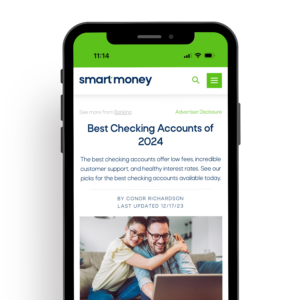Takeaways
- A credit report summarizes your credit history created by credit bureaus.
- Credit reports contain detailed information like credit age, utilization, etc.
- Lenders use credit reports to assess your eligibility for credit products.
- You can request a free credit report from each credit bureau annually.
- Lenders send information about your credit history to credit bureaus.
Some of the links in this article are from advertising partners of Smart Money, which does not influence our evaluations or recommendations. We work to provide you with accurate and reliable information. Our opinions are our own.
Have you ever tried to apply for a credit card? It is super easy. All you must do is log in to the online bank's website and apply for the credit card you want. You will know whether you are accepted or rejected in a matter of minutes.
This type of speed is accessible whether you are applying for a credit card, auto loan, mortgage, or personal loan because credit bureaus have created a credit profile report about you, called a credit report.
Your credit report speaks volumes about your financial history. It contains a treasure trove of information for lenders about your spending patterns, credit utilization, credit limits, credit age, ability to repay debt, and whether you make on-time payments.
What is in a Credit Report?
Like most Americans, you probably use consumer debt to help pay for day-to-day expenses like groceries, dining out, buying clothes, and more. Your credit score and report should be important to you because they determine the interest rate lenders will charge, financing terms, and other fees you might incur.
Whether you are considering making a large purchase that requires financing, like buying a car, purchasing your first home, or simply applying for a credit card, you should care about what is included in one of the most vital credit-related documents: your credit report. Let’s start with an analysis of what is included in your credit report:
Get Smart With Your Money
Fresh weekly articles delivered straight to your inbox.
Enter your name and email for free tips and tricks.

Revolving Accounts
This section lists each of your credit accounts with a credit limit. This revolving credit section contains all your credit cards. Each credit card has its section with a summary of the account and account history. This usually involves showing the balances, available credit, scheduled payments, and actual costs.
In addition to this information, it will list the specific credit limit of the credit card and any past-due amounts. This section is crucial as it shows lenders how you manage your financial obligations.
Mortgage Accounts
The mortgage section of your credit report highlights real estate loans that require monthly payments until the loan is paid off. This section might be blank if you are still saving for a down payment to purchase a home. However, if you are a first-time homeowner, you will have information populated in this area.
Your account history will show your mortgage balance, available credit, scheduled payments, credit limit, and any missed payments. The summary section will also include whether you have a fixed-rate mortgage or another type, such as an adjustable-rate mortgage. The account details section will consist of your term duration, monthly mortgage payment amount, and loan type.
Installment Accounts
The installment account section houses different information than the revolving credit section and mortgage section. Installment accounts are loans that require monthly payments until they are paid off, but they are not real estate loans. This section includes auto loans, personal loans, and student loans.
Like the other loan sections, this will have a history of your loan balance. For example, if you took out an auto loan of $30,000, this section will list that balance and your scheduled payments. It also highlights any missed payments and whether the loan was a fixed-rate loan or adjustable. Loan lenders will analyze this section of your credit report heavily.
Other Accounts
You can also have another account section if credit lines or obligations are not covered by the prior sections. This can include legal obligations, such as child support.
If you have signed onto a rental agreement, this section houses that information, which includes a history of payments, length of rental, and type of rental agreement.
Consumer Statement
You might want to take advantage of the consumer statement section of your credit report if you have no credit history, a limited credit history, or a bad credit history that you are trying to improve.
The consumer statements section allows you to give explanations (up to 100 words on the Equifax report) to provide more context for an item you are disputing or want more information on. Consumer statements do not affect your credit score.
Personal Information
Your credit report contains all your basic personal information compiled by different lenders. This identification section includes your name, address, social security number, age or date of birth, contact information, and employment history [1]. This data helps financial institutions confirm your identity and assess your stability.
You must ensure the credit bureaus correct this information if you see anything incorrect in this section, like a misspelled name.
Inquiries
In credit bureau parlance, each time a lender requests your credit history is called an inquiry. There are two main types of inquiries: hard and soft.
- Hard Inquires: Every time you apply for credit, the lender “inquires” into your credit report to assess your risk as a borrower. These are called hard inquiries and can affect your credit score. Hard inquiries can remain on your file for up to 2 years on an Equifax credit report.
- Soft Inquiries: Soft inquiries do not impact your credit score but may also appear on the report. Soft credit inquiries can be requested from you checking your credit file, an existing creditor examining your credit file, or a company with a promotional offer of credit.
Public Records
The public records section of your credit report sources public information from local, state, and federal courts through a third-party vendor (Equifax uses LexisNexis). This section includes:
- Bankruptcies: A bankruptcy is a legal status granted by a federal court that shows you are not able to pay off an outstanding debt. Bankruptcies can stay on your credit report for up to 10 years.
- Judgments: Judgments are legal orders from a court that you must pay back an outstanding debt. They can stay on your credit report for up to 10 years.
- Liens: A lien is a legal claim on one of your assets (e.g., car, boat, house). It usually results from a failure to make on-time loan payments. Liens can stay on your credit report for up to 10 years.
Bankruptcies, judgments, and liens usually hurt your credit report and severely hamper your ability to obtain future credit.
Collections
If you haven’t paid a bill you owe for a long time, your creditor may send your account to a collection agency. These actions are recorded under the collections section of your credit report.
Having collections on your report can significantly hurt your credit score and suggest to potential lenders that you have had trouble paying off debts. Collections can stay on your credit report for up to 7 years.
How is a Credit Report Created?
Credit reports are maintained by credit reporting agencies (CRAs), such as Equifax, Experian, and TransUnion. These agencies collect information from various sources, primarily creditors, including credit card companies, banks, and other lenders with whom you have had financial relationships. They also source information from court records and other public records.
Information from all these sources is then compiled into your credit report, which creditors, insurers, employers, and a few other entities can request. This report is usually used to evaluate your applications for credit, insurance, employment, or renting a home.
Is a Credit Report Important?
Absolutely. Your credit report is crucial in determining your financial health. It influences the chances of your loan approval and the interest rates you will be offered. According to a Consumer Federation of America survey, a poor credit score could cost a borrower $200,000 or more in lifetime borrowing costs than a consumer with a high credit score.
Your credit report can also affect your job prospects, rental applications, and insurance premiums. You can also use it to spot identity theft. Unexpected entries in your credit report, such as accounts you did not open or debts you do not recognize, could be the first sign of fraud.
When to Review Your Credit Report
Regularly checking your credit report is a smart money habit. You should aim to check your report at least annually to ensure all your information is accurate, complete, and up to date.
The federal Fair Credit Reporting Act (FCRA) entitles you to a free copy of your credit report every 12 months from each of the three major credit reporting agencies [2]. You can request these reports from AnnualCreditReport.com, the only authorized website for free credit reports endorsed by the Federal Trade Commission.
It's also smart to review your credit report:
- Before making a big purchase
- After you suspect your identity has been stolen
- If you are denied credit based on your credit report
Smart Summary
Understanding your credit report is a fundamental aspect of managing your finances. It affects your current financial opportunities and your future financial health. Checking your report is good financial hygiene. Proactively monitoring and understanding your credit report can save money and help you achieve your financial goals more effectively. Remember, in the realm of credit, knowledge truly is power.
(1) Consumer Financial Protection Bureau. What is a credit report? Last Accessed May 4, 2024.
(2) Federal Trade Commission. Free Credit Reports. Last Accessed May 4, 2024.








